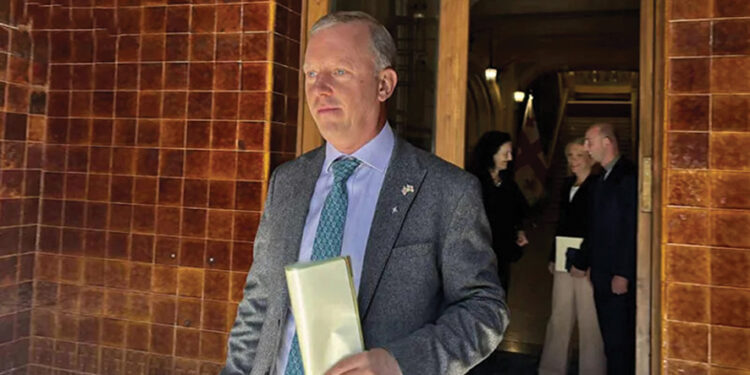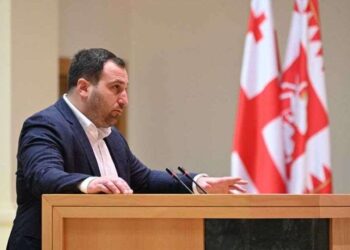Tbilisi is witnessing a sharp escalation in diplomatic tensions as Georgia’s government enters a public dispute with key Western allies following a series of confrontations involving foreign diplomats.
The friction began on September 24, when German Ambassador Peter Fischer was summoned to Georgia’s Ministry of Foreign Affairs—marking a historic first in German-Georgian diplomatic relations. The move was widely interpreted as retaliation for Fischer’s recent critical remarks about Georgia’s stalled EU integration efforts.
After the meeting, Ambassador Fischer took to social media, expressing his dismay:
“The first ‘summons’ of the German ambassador to Georgia. For Germany. I have thoroughly denied the unfounded attacks against me and placed the responsibility for the new low point in German-Georgian relations on the Georgian government and representatives of Georgian Dream, who have caused this through actions and rhetoric and are blocking the path to the European Union. They didn’t listen to me. I am not a radical. Germany remains a friend.”
Germany’s Foreign Ministry responded forcefully, publicly defending Fischer and criticizing the Georgian government’s actions:
“We categorically condemn the aggressive rhetoric of the representatives of Georgian Dream towards the German Ambassador to Georgia, and his groundless summons today,” the statement posted on X read.
Berlin emphasized that Fischer was operating in full compliance with international diplomatic standards and representing the official stance of the German government.
Georgia’s Foreign Ministry offered a different view. In its statement, the ministry said Fischer had been reminded of his obligations under the Vienna Convention on Diplomatic Relations, particularly the requirement to respect the host country’s laws and to avoid interfering in internal affairs. Georgian officials accused some foreign diplomats of encouraging radical political agendas, attempting to influence judicial processes, and contributing to social polarization. The ministry also said it had requested concrete evidence from the German Embassy regarding alleged hate speech and disinformation—none of which had yet been provided.
Despite these grievances, the ministry reaffirmed Georgia’s desire to maintain strong international partnerships and called for mutual respect moving forward.

Another Summons, More Fallout
The diplomatic row deepened on September 25, when UK Ambassador Gareth Ward was also summoned to the Foreign Ministry. While he declined to comment before the meeting, he had earlier posted a message on social media reaffirming the UK’s commitment to its partnership with Georgia:
“For over 30 years, the UK has worked hand-in-hand with Georgia to build a stronger, more resilient future. From education and innovation to human rights and regional stability – our partnership is built on trust, respect and shared values. In the face of misinformation, we choose facts. We choose impact. We choose transparency.”
In a rare act of unity, 27 embassies and diplomatic missions, including those of the UK, Germany, France, the US, and the EU, issued a joint statement strongly rejecting the Georgian government’s accusations:
“We firmly reject the baseless and damaging accusations about the role and activities of some diplomatic missions in Georgia. Such disinformation misleads the public and undermines the possibility for our diplomatic missions to carry out our duties.”
The signatories emphasized that engaging with a wide range of stakeholders—from government and opposition to civil society—is standard diplomatic practice and fully in line with the Vienna Convention.
They also stressed that none of the missions support any political party, extremism, or violence:
“We urge all political leaders to refrain from divisive rhetoric and to work towards the de-escalation of tensions.”
Prime Minister’s Sharp Rebuke
Responding to the growing backlash, Prime Minister Irakli Kobakhidze defended the decision to summon the ambassadors and strongly criticized the conduct of several European diplomats:
“Unfortunately, ambassadors from the European Union often blatantly violate principles and rules. This is unacceptable. An ambassador in Georgia should behave as an ambassador, not as a politician. Not everyone behaves like the ambassadors of the EU, UK, and Germany—thank God.”
Kobakhidze argued that the ambassadors had crossed diplomatic boundaries and accused them of interfering directly in Georgia’s internal political processes:
“Specific ambassadors are directly involved in political processes, which is a gross violation of democratic principles and the Vienna Convention. Summoning them is a normal diplomatic measure to ensure they return to the diplomatic framework.”
The Prime Minister accused the EU Ambassador of calling on Georgian voters to mobilize against the government—a move he described as a blatant violation of diplomatic norms. He also cited previous instances where ambassadors had allegedly tried to influence judicial proceedings by attending court cases.
“Europe used to be a symbol of respecting rules. Now, some EU ambassadors are undermining those very principles. What we are seeing today reflects serious issues within the European bureaucracy.”
Kobakhidze emphasized that ambassadors do not act independently but represent their respective states—and summoning them sends a message not only to the individuals but to the governments behind them.
As Georgia heads toward pivotal parliamentary elections on October 4, these diplomatic clashes cast a shadow over its relationship with Western allies. What was once a steady path toward European integration is now entangled in growing mistrust, competing narratives, and public accusations of political interference on both sides.
By Team GT














